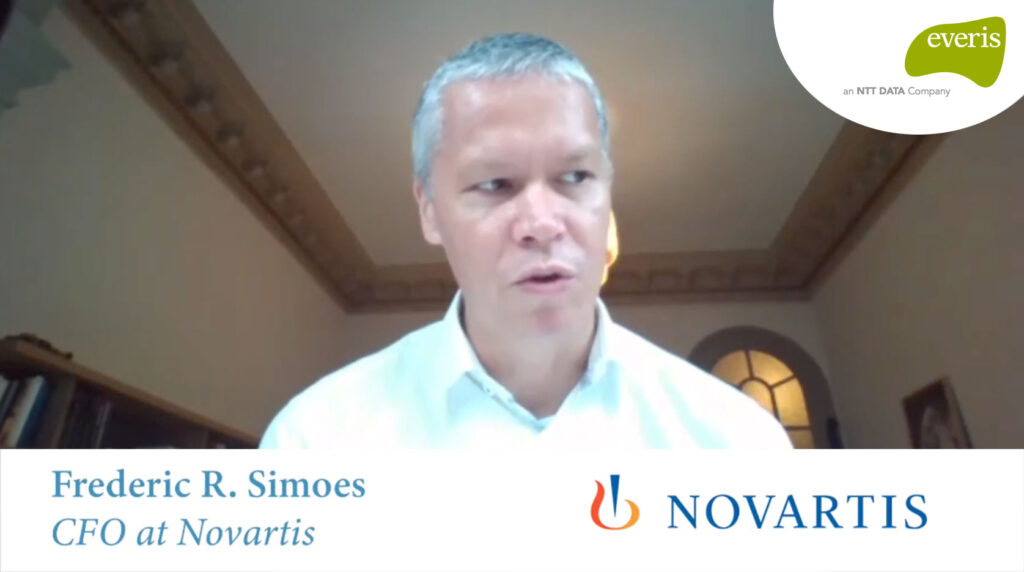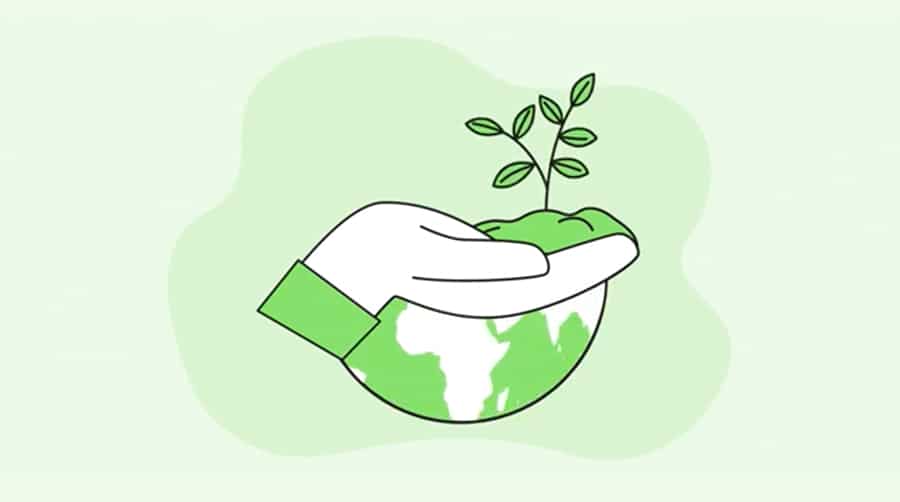On April 21st, everis hosted an online event to debate with CFOs how COVID-19 is impacting the market and what finance leaders are doing to support their organizations and teams.
Frederic R. Simoes, Novartis CFO gave us his direct view on how his company and finance community are reacting and planning the “New Normal”.
“First I would like to mention that I am the Chief Financial Officer of Novartis in the Business Services division which is an internal service organization that handles all aspects of accounting services, human resources, IT, real estate, as well as scientific developments. Until recently I was Chief Financial Officer of Novartis in Spain.
800 million patients, these are the patients who benefit from Novartis’ treatments worldwide. 10 million in Spain and in these moments when our activity and in some cases our life has been put on pause, what we do know is that the diseases from which these patients suffer do not take a breather. Although the purpose of the pharmaceutical industry has always been clear, been very present to us, the truth is that during this pandemic we have reconnected with the purpose of what we do as a company. We have also realized, in addition to the privilege and responsibility that our work brings, we are able to work with the health professionals that we have in this country.
We have gone from a scenario in which everything was already very complex to a chaotic scenario and perhaps you have heard the phrase that when you enter a time of crisis you always think that you are making decisions too quickly and when you leave that situation, you realize that you should have acted much, much faster.
Well, in a chaotic world we cannot wait for more information. We must act with much more urgency and with a more agile work model on a trial and error basis.
The impact for the pharmaceutical industry, to provide our perspective, has been at a rather operational level, apart from, of course, impacting all employees who work from home. For us, the priority has been to ensure that the 30,000 employees who work in laboratories and factories can continue to go to their jobs while the other 80,000 work from home.
For the pharmaceutical industry, basically this has impacted us in terms of the reduction of clinical studies. Most of our doctors, 80% of them, have a low volume of activity in terms of medical visits. The production chain, as you can imagine, has been greatly affected because 80% of the active ingredients used for treatments come from China and India. I will talk about this another time.
Sixty percent of our factories are in countries where there are strict confinement measures. And the pharmaceutical industry in general, which is also the case for Novartis, had about 90 launches that have been impacted by this crisis. This is considering the short term; in the long term, being an industry that depends on public financing in many countries, we understand the measures that governments will have to take to support the economy and the loss of jobs that will stem from this crisis. There will be a lot of pressure at the financing level, so we have to prepare for the long term.
Now, it is not all that dark. The response of the pharmaceutical industry on one hand has been dedicated to what must be done; it is an unprecedented response in terms of research. To date there have been about 585 registered clinical studies, more than 100 molecules in clinical study, most of them for vaccines but also antivirals and other hydroxychloroquine antivirals as you have seen in the news. But also, we must highlight the response in assisting the healthcare system by making donations.
And then, something that you may have seen in your companies is the protection of employees, making sure, as I said, that those who must go to their jobs do it safely and that others can work from home without a problem.
I have to say that we have been lucky; a sustainability initiative that we had has saved us. We were preparing for an event, and had to cancel everything, travel for a month. We had invested in a number of things such as implementation of Microsoft Teams, more VPN points, more broadband, more capacity, etc. We made a series of investments that have helped us survive this first blow very well.
Apart from this, apart from protecting jobs, we have also focused on protecting clients, suppliers and our associates (partners).
The focus has been on evaluating our cash availability and the availability of new sources of financing. For example, in Spain we have performed factoring operations.
I would also like to comment on the issue of continuity at the supplier level; we have had to help some of the suppliers with reverse factoring to reduce payment installments so they can continue their activity. One thing that we are looking at in the long term but is also affecting us in the short term are decisions about divestments or M&A activities which have stopped because they involve Chinese countries or partners or because they are simply not a priority and this affects our cash position. We had for example (….). But we are also trying to prepare ourselves for when we return to normal activity so we can take advantage of the opportunities offered to us in merger & acquisitions.
As for finances, we have also put aside everything that was forecasted and we are working based on scenarios. We are attempting to understand how each of the countries and therapeutic areas will respond to to this new challenge and be able to carry out activities that allow us to allocate resources to various zones or therapeutic areas when we see that a commitment is required in the return to normality in operations. This is on a financial level.
On a digital level, digital connectivity for us has been the key to business continuity. I think it will impact our business definitively. We were talking about contactless cards, because I think we are going to use contactless televisits so our delegates (sales reps?) can connect with doctors. We are going to talk about very important launches for us this year.
Nowadays we force our patients to appear in hospitals for clinical studies. For some of our studies, if we think about the number of visits, there is a risk that patients could contract other diseases. Eighty percent are things that we had already been exploring, but with the crisis we have seen that it is possible and we think that it will accelerate. Also many of our treatments in the pharmaceutical industry force patients to go to hospitals to receive their treatments. We think that we have proven this during this crisis that there is availability of nurses who can see patients at home. Additionally the delivery of products to patients’ homes is going to become the ‘new normal’ too. And the other thing that we have seen, we are always looking at the pandemic data every morning, is that none of this data is reliable. We think that the focus on data and on the measurement of results is something else that will continue to impact the pharmaceutical sector.
And finally regarding leaders, I will not elaborate, but we see a lot of anxiety on the part of our employees to be able to continue doing their jobs, but there is also anxiety for their families and friends, so as leaders, empathy and transparency in communication are very important. I mentioned it at the beginning, we cannot wait for all the information, we cannot wait for another meeting, for all of the explanations, but we must take responsibility, make decisions, and act, and above all, transfer a sense of optimism to what comes after this.
I want to close by talking about the 1918 pandemic that, apart from impacting many lives, allowed us to strengthen the health systems of European countries. We think that this crisis will also prepare us for great pandemics to come. We will not be immune to this, but we do think that we will come out stronger. We particularly think that the role of companies in society will be seen because while many politicians are not acting in a very inspiring way, we have seen many companies both within and outside of the sector act in a very inspiring way. We think that the idea of social responsibility is gaining strength and we face the future with optimism.
Very well, that’s all. Thank you very much.”










